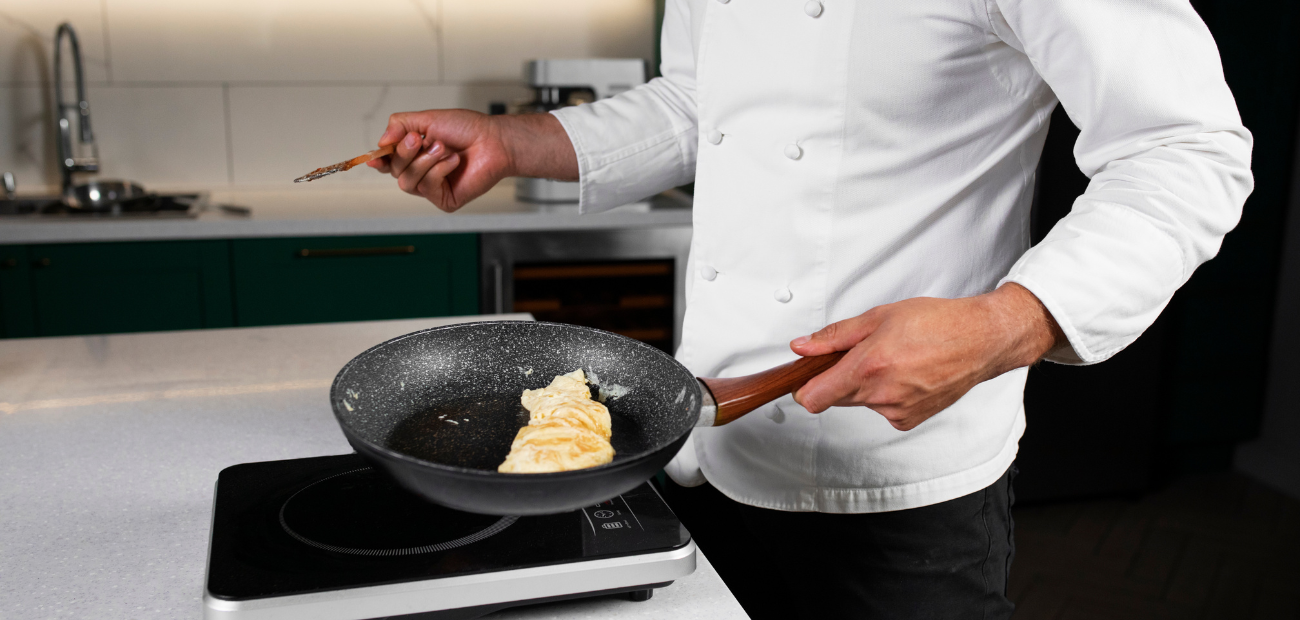Benefits of Cast Iron for Home Induction Cooking: A BBQ Lover's Guide
Written By James Morgan
As a barbecue enthusiast, you're probably always on the lookout for ways to enhance your cooking experience. The benefits of cast iron for home induction cooking are numerous, especially for those who appreciate the nuances of grilling and slow-cooked flavors. Cast iron cookware, known for its durability and excellent heat retention, is a perfect match for induction cooking. Let's dive into why this combination should be a staple in your kitchen.

The Perfect Pair: Cast Iron and Induction
One of the major benefits of cast iron for home induction cooking is its compatibility. Unlike some other materials, cast iron is inherently magnetic, which is a requirement for induction cooking. This means it can efficiently transfer heat, making it ideal for searing steaks and maintaining the perfect temperature for slow cooking.
Moreover, cast iron's ability to retain heat is unparalleled, ensuring that your food is cooked evenly. This is particularly beneficial when you're trying to achieve that perfect sear on your steak or when you're slow-cooking ribs to tender perfection. The heat retention also means you can use lower temperatures, preserving the flavors and nutrients in your ingredients.
Durability and Longevity
Another compelling reason to choose cast iron for your induction cooking is its durability. A well-maintained cast iron pan can last for generations. This resilience is particularly advantageous for barbecue enthusiasts who might subject their cookware to high temperatures and intensive use.
To ensure your cast iron remains in top condition, it's important to season it regularly. This process involves coating the pan with a thin layer of oil and heating it, creating a natural, non-stick surface. Over time, this seasoning improves, enhancing the flavor of the food you cook. For tips on how to maintain your cast iron, check out this maintenance guide.
Versatility in Cooking
Cast iron isn't just for the grill or stovetop. Its versatility is one of its greatest strengths. Whether you're baking cornbread, frying chicken, or even making a skillet cookie, cast iron can handle it all. This versatility extends to induction cooking, where the precise temperature control can help you perfect a wide range of recipes.
Induction cooking with cast iron also opens up new possibilities for outdoor cooking. Portable induction cooktops paired with cast iron skillets or Dutch ovens allow you to bring your culinary skills to any outdoor gathering, adding a touch of gourmet flair to your barbecue parties.
Health Benefits
Cooking with cast iron can also offer health benefits. Unlike non-stick pans that may release harmful chemicals at high temperatures, cast iron is a safe and natural alternative. Additionally, cooking with cast iron can actually increase the iron content of your food, which is beneficial for those with iron deficiencies.
For barbecue enthusiasts who often cook meat, this is an added bonus. The iron leached into your food from the pan can contribute to your daily nutritional intake, making your meals not just delicious but also healthy.
Efficient and Eco-Friendly
Induction cooking is known for its energy efficiency, heating only the cookware and not the surrounding air. This means less energy is wasted, and your kitchen stays cooler, a significant advantage during the hot summer months. Coupled with the heat retention of cast iron, this makes for a highly efficient cooking process.
Furthermore, cast iron is an environmentally friendly choice. Unlike cookware with synthetic coatings, cast iron is made from natural materials and can be recycled. For those looking to reduce their carbon footprint, investing in quality cast iron cookware is a sustainable choice.
Cooking Tips and Tricks
To get the most out of your cast iron on an induction cooktop, preheat your pan slowly to avoid thermal shock, which can cause it to warp. Also, remember to use oils with high smoke points to keep your seasoning intact.
For more tips on using cast iron with induction, you can visit this helpful guide.
Conclusion
The benefits of cast iron for home induction cooking are substantial, especially for barbecue enthusiasts who appreciate flavor, durability, and versatility. Whether you're searing, frying, baking, or slow-cooking, cast iron on induction delivers exceptional results. By incorporating this powerhouse combination into your culinary repertoire, you're not just enhancing your cooking experience; you're also embracing a sustainable and health-conscious lifestyle.

FAQs
1. Can I use all types of cast iron on induction cooktops?
Yes, most cast iron cookware is compatible with induction cooktops due to its magnetic properties.
2. Is seasoning necessary for cast iron when using induction?
Yes, seasoning is essential to maintain the non-stick surface and enhance the flavor of your dishes.
3. How does induction cooking compare to traditional methods?
Induction cooking is more energy-efficient, offers precise temperature control, and heats up faster than traditional methods.
For more insights on induction cooking, you might find this detailed article helpful.



